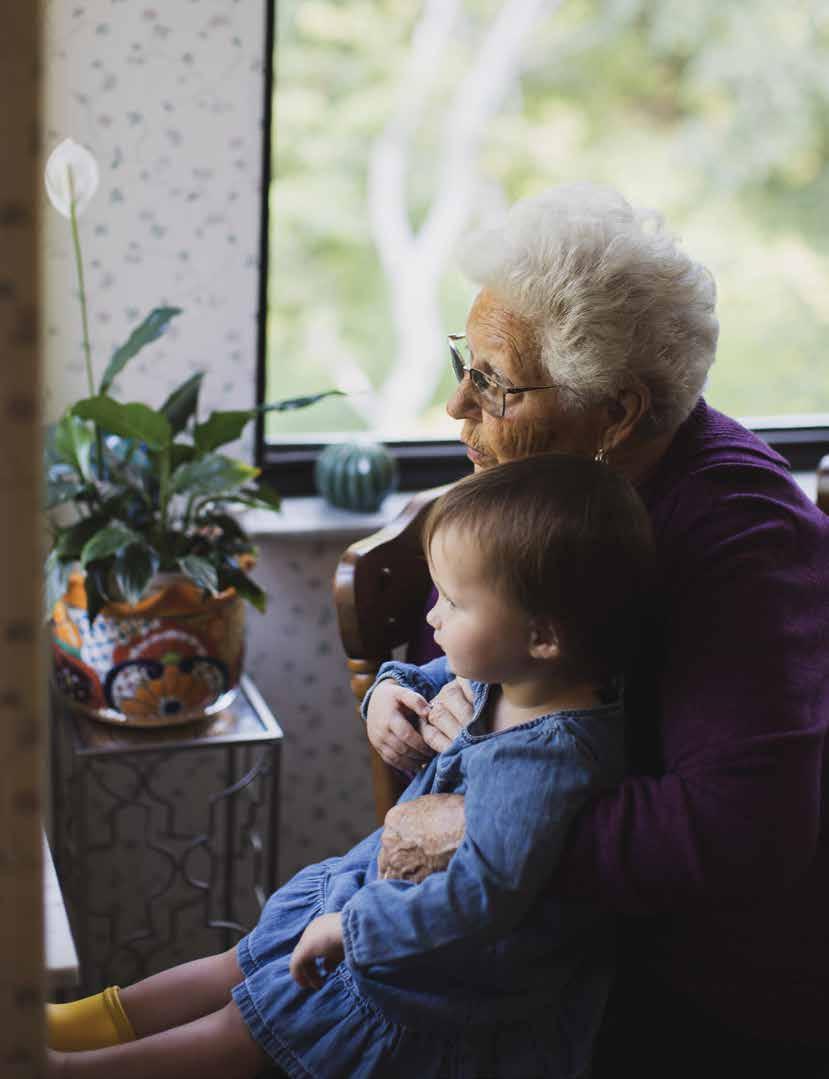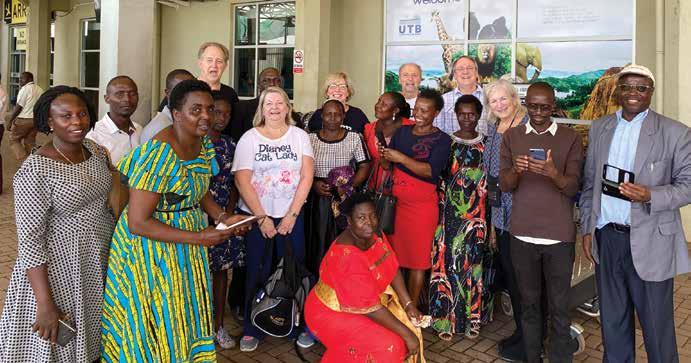
9 minute read
SEEING THROUGH THE EYES
Seeing Through the Eyes of Christ

Advertisement
BY KATIE SCIBA
My favorite children’s book is You Are Special by Max Lucado. that humanity goes deeper than a person’s body. My 83-yearIt’s the story of a creature whose life is defined by what others old neighbor recently shook his head at his own physical think of him, which only worsens his low self-esteem. The limits, saying he felt like a 30-year-old on the inside. Despite tragedy of the story lies not in the main character, who his age, he was the same person as he was 50 years prior. eventually learns his worth comes from his Creator, but in Within each person lies a soul with the imprint of God. the surrounding society, who fail to see the profound value of those they consider to be lowly. PEOPLE WITH DISABILITIES Our value is defined in the creation narrative. In creating of Persons with Disabilities for the Archdiocese of Cincinnati. man, God voiced His intention, “Let us make man in our “The office exists to spotlight dignity and defend dignity,” image after our likeness.” (Gen. 1:26) God formed Adam she said. “It’s our job as the body of Christ to advocate for from the clay and gave him the breath of [people with disabilities].” God. This divine gift wouldn’t be repeated until Jesus breathed on the disciples in the That advocacy is multi-faceted, but the upper room, giving them the Holy Spirit. work Collis-DeVito is most excited This is our foundation. Every person is Masses across the archdiocese. People made in the image and likeness of God affected by Alzheimer’s Disease, autism, and therefore, possesses inherent dignity Down’s Syndrome and other disabilities and deserves respect. Across Christian can be easily overwhelmed by different communities, October is Respect Life environments. Sensory-friendly Masses month. Humankind in every location, decrease stimulation. This means softer race, education level, of every age, with or music and briefer homilies, as well as without common abilities, shares at least pictures of the order of Mass in pews so this one thing in common: We are made attendants can follow along easily. by divine design. In identifying the source EMBRACING DISCOMFORT In light of this, there are groups of people who may be neglected, avoided or judged; of our discomfort, we’ll be able to move through it and see the inherent This Mass not only provides a more adaptive environment for persons with special needs, but it’s also a place where congregants can serve in the liturgy. those who need respect and mercy because dignity of disabled people. “We all have gifts to give one another. of their various levels of vulnerability. It’s Here, congregants contribute to the understandable to be unsettled by others Mass,” Collis-DeVito said. The ability who function and behave differently than we do, but in order to contribute gives a sense of worth and pride of self. to imitate Jesus, we have to open our eyes to what we have in common. Though not an exhaustive list, the elderly, people Collis-DeVito has a tremendous heart for her work, yet she’s with disabilities and the incarcerated are among those who, confident that anyone can go beyond themselves to serve. for one reason or another, might give us pause when we’re “If something makes you uncomfortable, then go toward trying to love as Christ does. it. If we’re uncomfortable, we need to ask ourselves why. THE ELDERLY our discomfort, we’ll be able to move through it to see the Every year at summer camp, we took a visit a nearby nursing inherent dignity of disabled people. home. The residents received us happily and enjoyed the songs we sang for them. The general idea was to bring a THE INCARCERATED little sunshine to the elderly. Despite the good intentions, While this can be challenging, even more so may be however, there were several campers who were unsettled in recognizing the dignity of people whose lives aren’t riddled the experience. Several residents were disabled or deformed with disability, but guilt, as the case might be with those who from age or illness. For the hesitant campers, interactions are incarcerated. came awkwardly if they came at all. Noelle Collis-DeVito directs the recently-established Office about is providing sensory-friendly What is it that unsettles us?” In identifying the source of “Everyone needs forgiveness, to forgive someone, or both.” This experience isn’t exclusive to children. When we encounter said Mary Arlinghaus, director of the Office of Incarceration people different from ourselves, soulful connections can be Ministries for the archdiocese. Thinking back to his initial more difficult. Ease of interaction calls for understanding days of prison ministry, Arlinghaus was uncertain how to
interact with inmates. His experience was simplified when an accompanying priest gave him advice: “Say hi. Shake hands. It’ll be okay.”
Arlinghaus recalled the men entering the facility chapel. “They were just guys coming to Mass. I didn’t know what they did, yet there I was, standing with them, worshiping the Lord.”
The experience of being in the presence of Christ was not just grounding, but eye-opening for him. “I was kneeling next to [an inmate] after the Sanctus. It struck me so hard that this is my brother in Christ.”
“There are many voices who want to make their guilt their identity…but what defines them is that they belong to God.” That’s the only thing, Arlinghaus offered, that can break through the bars in their minds.
When asked how we could encounter the humanity of prisoners and avoid judging them by what they’ve done., Arlinghaus said, “It happens slowly with a lot of presence and patience and persistent prayer… It’s continually being that person reminding them that it’s God


Supporting life ...and those who hold on to it.
Dayton-area high schools thank those who selflessly work to end abortion.

From this truth, many in prison experience personal victories. “Even if they don’t go through RCIA, they begin to realize they’re more than the sum of their failures and traumas.”
Despite their personal backgrounds, Arlinghaus and his team still see conversions. “It truly is powerful to see the transformation when they receive the grace of the sacraments,” he said. “Prison ministry rests on, fundamentally, the respect for life from its most vulnerable stage. It doesn’t stand unless it has that position,” he added.
From conception onward, every human life is made in the image and likeness of our Creator. We’re made for imitation of Christ, which means that it is paramount that we mirror His respect. Jesus ate and stayed with people whom others judged. He reached out to the sick and acknowledged the worth of the disabled. When others condemned, the Lord extended mercy. This month, we recall our common foundation of divinely-appointed dignity and ask the Lord to allow us to see others as He sees them.
Project Rachel A post-abortive healing ministry of the Archdiocese of Cincinnati

Anyone a ected by an abortion experience is welcome to join us for a Day of Re ection on October 3rd Due to the uncertainty of the COVID19 pandemic, Spring Events will be announced as we move closer to March of 2021. Please visit catholiccincinnati.org/project-rachel for more up to date information.

Con dential Communication 513.784.0531 • hopeandhealingcinci@gmail.com
BEING PRO-LIFE THE BROAD SPECTRUM OF LIFE ISSUES
I have been writing this column for two years, discussing various Respect Life topics each month. The vast majority of comments I receive about this column and its related videos/podcasts are positive. Readers and listeners appreciate that issues that often go unnoticed receive attention, and enjoy learning how to volunteer or donate to the cause. I do, however, also receive questions asking why a column devoted to life issues would address topics that some do not perceive as relevant to the pro-life cause.
The Church has many life-related concerns, the most obvious among them being abortion, euthanasia, capital punishment and bioethics topics like stem cell research and in-vitro fertilization. However, no issue, not even “respect life,” exists in a vacuum.
CONTINUED CARE Many who refer to themselves as prochoice often accuse “anti-abortionists” of only caring about babies until they are born. Visiting any of the many pregnancy care centers in the Archdiocese of Cincinnati quickly dispels that notion. Pregnancy care centers take care of the woman in a crisis pregnancy, and continue to offer assistance to the family for years after the child is born. The criticism that pro-life people don’t care about babies after birth is not true. What is true is that to show concern for an issue with integrity, we must also show concern for all its interconnected issues.
INTERCONNECTED ISSUES Concern about abortion leads to concern about women who have had abortions; care for women in crisis pregnancies; help for victims of domestic violence and many other issues related to why women feel abortion is a viable option. Concern about euthanasia leads to concern for the elderly, good palliative care and respect for the handicapped. Concern about capital punishment leads to concern about how the judicial system works; why some people are more likely to receive the death penalty than others for the same crime; how we treat prisoners and how to help people who are newly released from prison obtain a job. We are thus concerned about many issues, all of which ultimately fall under the banner of “Respect Life.”
The U.S. Bishops in their 1998 letter, Living the Gospel of Life, expressed it this way: “Opposition to abortion and euthanasia does not excuse indifference to those who suffer from poverty, violence and injustice. Any politics of human life must work to resist the violence of war and the scandal of capital punishment. Any politics of human dignity must seriously address issues of racism, poverty, hunger, employment, education, housing and health care.”
This is not to say that all issues are morally equivalent. Direct attacks on human life will always be the premiere life issues, but reminding people of their related issues is also important.
This column is also connected to a podcast found at www.buzzsprout.com/210499. Browse through to learn more about topics related to primary life and death issues. We must be of a common mind and heart with all the important work that we must do to counter the culture of death in our society.
BOB WURZELBACHER is the director of the Office for Respect Life Ministries. He and his wife, Cindy, live in Sharonville with their two young daughters.






